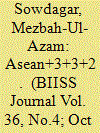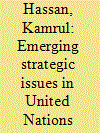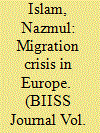|
|
|
Sort Order |
|
|
|
Items / Page
|
|
|
|
|
|
|
| Srl | Item |
| 1 |
ID:
148558


|
|
|
|
|
| Summary/Abstract |
The recent trends of regionalism in the Asia-Pacific region in perspective of the ASEAN+3+3 (Association of South East Asian Nations+China, Japan and Korea+Australia, New Zealand and India), officially known as the East Asia Summit (EAS), are important for international relations. Especially, China’s growing role and influence in this ASEAN centric new international order have attracted scholars of international relations substantially. China responded to the structural changes in East Asia, managed to transform its policies for the region in the mid-1990s and began to engage more actively than before in multilateral frameworks. The involvement of United States (US) in the regionalism has furthered a new political and strategic facet. Particularly, with this engagement, the US has made a big policy shift in the region. Taking into account of this policy shift of the two great powers, US and China, the paper mainly addresses two specific questions. First, what are the invisible dynamics of EAS politics after the US involvement? Second, how are the inside rudiments of security, political and strategic connotation in this regionalism after the US engagement? The paper aims to explain significance of recent trends of EAS centric regional competition and a deeper understanding of the increasing security, political and strategic nuances of the Asia- Pacific regionalism. The paper argues that ASEAN is inviting both powers to compete with each other through its balancing role. In the name of regional grouping, a regional security competition has been started under the umbrella of EAS.
|
|
|
|
|
|
|
|
|
|
|
|
|
|
|
|
| 2 |
ID:
148556


|
|
|
|
|
| Summary/Abstract |
United Nations (UN) peacekeeping activities have seen an exponential growth in both size and scope since their inception in mid-1950s. These operations are now seen as the core activity of the international community’s effort to establish peace in conflict-torn countries around the world. Operational environment and nature of threats in the UN Peacekeeping Operations (PKOs) area are continuously changing. UN also had to evolve and adopt new strategies to cope up with the operational environment. Changes in the operational strategy of UN are a continuous process. Troops Contributing Countries (TCCs) need to remain fully abreast with the strategies of UN to prepare their armed forces accordingly. The landmark Brahimi Report has manifested a renewed vision for UNPKOs to make them more effective and comparatively cost-efficient. It includes several important recommendations for enhancing capacity and effectiveness of UNPKOs. UN has already implemented some reforms according to the recommendations of the report in various areas of PKOs such as peacekeeping policy and strategy, structure of peacekeeping department, conduct and discipline etc. The reform agendas and other evolving strategic issues demand in-depth analysis by TCCs. This paper highlights important evolving strategies of UNPKOs along with an analysis to reveal their implications to the Bangladesh Armed Forces. Apparently, it is felt that Bangladesh Armed Forces may struggle to continue its current share in troops contribution if appropriate measures are not taken to face foreseeable challenges. The paper also recommends few measures which may help Bangladesh Armed Forces take benefits of the opportunities and minimise effects of the perceived challenges resulting from the evolving strategies.
|
|
|
|
|
|
|
|
|
|
|
|
|
|
|
|
| 3 |
ID:
148555


|
|
|
|
|
| Summary/Abstract |
Bangladesh does not carry an enduring maritime legacy in its strategic formulations or in policymaking though historically the Bengalis carry significant legacies as seafarers, boat-makers, traders and shipbuilders. The recent international legal verdicts on Bangladesh’s maritime claims make a difference as these offer multifaceted prospects. The paper addresses issues and concerns regarding maritime legacies of Bangladesh and prospects generated from the verdicts. It brings together perceived national interests vis-a-vis current extended maritime territory and how all these correlate to the nation’s aspirations, touching upon the means necessary to materialise the aspirations. The paper considers trends in strategic analysis and utilises notional views of classical Chinese thinker Sun Tzu as a reference point to bring forward the maritime legacies and prospects of Bangladesh. In this context, maritime research is viewed as of decisive importance for Bangladesh that may enable the country to select the best strategic option available to ensure its sustained prosperity as a maritime nation. The paper pleads for a coherent maritime policy framework coupled with extensive research pursuits and policy coordination for a fast-track approach to development ensuring greater awareness on maritime affairs, a more secure maritime destiny, which is consistent with the nation’s strategic vision.
|
|
|
|
|
|
|
|
|
|
|
|
|
|
|
|
| 4 |
ID:
148559


|
|
|
|
|
| Summary/Abstract |
In 2015, one of the most challenging tasks for leaders and policymakers in Europe has been to deal with the recent migration crisis therein. Despite the crisis being rooted in different parts of the Middle-east, Asia and Africa, Europe is facing its aftereffects. Because of having different perspectives like humanitarian and security issues, the situation has become complicated. As a result, response from the European Union (EU) in managing the situation has been divided. However, different measures have already been taken by the EU members and other relevant actors to find out some temporary solutions. Besides the EU, major global powers and the Gulf countries need to take additional responsibilities. For finding a durable solution, it is necessary to address root causes of the crisis and develop strategies towards the countries that help generate mass irregular migration.
|
|
|
|
|
|
|
|
|
|
|
|
|
|
|
|
| 5 |
ID:
148557


|
|
|
|
|
| Summary/Abstract |
Non-State Actors (NSAs) are regarded as important stakeholders in global climate negotiations to uphold the views of climate change victims all over the world. Defining NSAs and why do state actors allow them to participate in the negotiation process are drawing academic interest. During the Conference of Parties (COP), under the United Nations Framework Convention on Climate Change (UNFCCC), NSAs try to influence policies by sharing knowledge and enforcing pressure on state actors in order to adopt effective policies. In contemporary climate change negotiations, NSAs’ policy influence can be understood in two ways: first, as “outsider”, when they put pressure on state actors without participating in the negotiation; an second, as “insider”, when they directly participate in the negotiation process. In this respect, the main objectives of this paper are to evaluate policy influencing strategies of NSAs in the negotiations and what are the challenges they face to influence the policies.
|
|
|
|
|
|
|
|
|
|
|
|
|
|
|
|
|
|
|
|
|